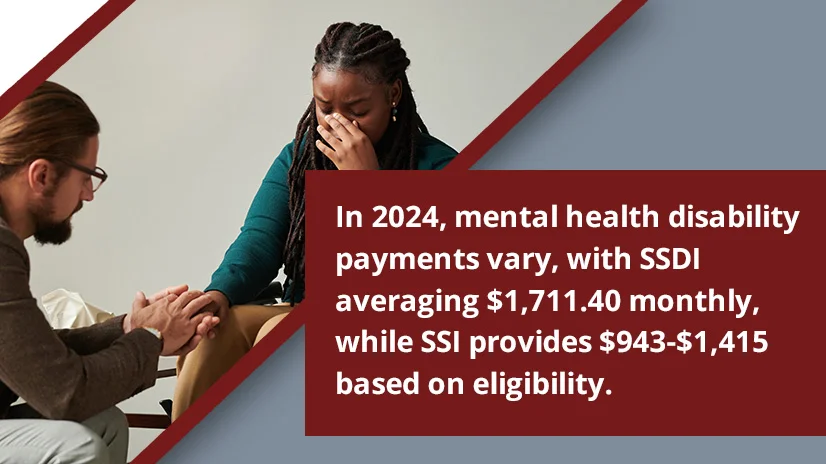
Mental Health Disability Payments In 2024
Mental health disability payments provide financial assistance to those people who are unable to work due to a mental health condition. These payments aim to support individuals with severe impairments that profoundly limit their ability to perform substantial gainful activity (SGA).
In the United States, the amount of disability pay varies based on factors such as work history, income level, and the severity of the condition. Understanding these payments is essential for those navigating the complexities of mental health challenges and seeking financial stability.
Key Takeaways
Mental health disabilities can significantly impact daily life, requiring tailored support and understanding. This article covers:
- It’s essential to recognize the severity and lasting effects of mental health conditions when seeking disability support.
- Mental health disability payment varies; in 2024, SSDI averages $1,711.40 monthly, while SSI provides $943-$1,415 based on eligibility criteria.
- Applying involves thorough documentation and avoiding common mistakes to increase the chances of approval.
For comprehensive inpatient psychiatric services tailored to your individual needs, contact Indiana Center for Recovery at (844) 650-0064.

Understanding Mental Health Disabilities
A mental health disability refers to a condition that significantly impairs a person’s ability to function in daily life due to mental illnesses. These disabilities are recognized by the Social Security Administration (SSA), which provides financial assistance to eligible individuals through two main programs, including:
- SSDI (Social Security Disability Insurance): This is for those who have worked and paid Social Security taxes. Eligibility is based on work history and the severity of the disability.
- SSI (Supplemental Security Income): Provides benefits to disabled persons with limited income and resources, including children, who haven’t paid enough into Social Security.
Both SSDI and SSI provide critical financial support to individuals with various mental health conditions. These conditions include, but are not limited to:
- Major depressive disorder (MDD)
- Bipolar disorder
- Schizophrenia
- Anxiety disorders
- Post-traumatic stress disorder (PTSD)
- Obsessive-compulsive disorder (OCD)
Understanding these conditions and the types of disability payments available is crucial for those seeking financial support due to mental health disabilities. It ensures individuals can access the appropriate benefits to help manage their conditions and maintain financial stability.
How Much Does Mental Health Disability Pay?
Understanding the financial support available through SSDI and SSI is crucial for individuals with mental health disabilities. Let’s explore it in detail:
How SSDI And SSI Define Disability
SSDI and SSI both require that a mental health condition be severe enough to prevent substantial gainful activity. However, their definitions and requirements differ slightly.
SSDI defines disability as the inability to engage in substantial gainful activity (SGA) due to a medically determinable mental health impairment that is expected to last at least 12 months or result in death. Conditions such as anxiety, severe depression, bipolar disorder, and schizophrenia must significantly limit the person’s ability to perform basic work activities.
SSI defines disability similarly but is aimed at individuals with limited income and resources. The mental health condition must prevent the person from working and be expected to last at least 12 months or result in death. SSI also considers the financial needs of the applicant, making it accessible to those who have not worked enough to qualify for SSDI.
Average SSDI Payment Amounts For 2024
The SSDI benefit amount is based on the individual’s average lifetime earnings before the onset of the disability. As of January 2024, the average monthly benefit for disability insurance is $1,711.40. The number of factors that influence this amount include:
- Work History: The number of years worked and the amount paid into Social Security benefits through taxes.
- Severity Of Condition: While the severity primarily determines eligibility, the benefit amount is more influenced by work history.
- Age At Disability Onset: Younger individuals with fewer work years may receive lower benefits compared to those with longer work histories.
These factors collectively determine the SSDI benefits, providing a safety net for those unable to work due to severe mental health conditions.
Average SSI Payment Amounts For 2024
SSI benefits are designed for individuals with limited income and resources. The maximum monthly SSI amounts for 2024 are:
- $943 for an eligible individual.
- $1,415 for an eligible couple.
SSI does not require a work history, making it accessible to individuals who may not have sufficient work credits under SSDI. The benefit amounts can vary based on:
- Income: Any income received by the individual can reduce the SSI payment.
- Living Arrangements: Where the person lives and their household expenses can affect the benefit amount.
These factors ensure that the SSI benefits are tailored to support those with financial needs and severe disabilities.
Latest Cost-Of-Living Adjustment For 2024
To help offset inflation, the Social Security Administration (SSA) implements an annual cost-of-living adjustment (COLA). For 2024, the COLA is 3.2 percent, which means that both SSDI and SSI recipients will see a surge in their monthly payments starting in January 2024. This adjustment is dependent on the consumer price index (CPI), reflecting alterations in the cost of living. As prices for goods and services rise, the COLA helps ensure that benefits maintain their purchasing power.
By staying informed about these benefits and any changes, individuals can better navigate the financial challenges posed by mental health disabilities.
Other Mental Health Disability Benefit Programs
In addition to SSDI and SSI, other mental health disability benefit programs may be available depending on the state and specific circumstances:
Veterans Administration (VA) Benefits
The Department of Veterans Affairs (VA) offers benefits tailored to unmarried and married veterans with service-connected mental health conditions. VA disability benefits include compensation for injuries and illnesses resulting from military service, which ensures veterans receive necessary care and support.
State Disability Insurance (SDI)
State Disability Insurance programs vary by state but generally provide temporary financial support to individuals unable to work due to non-work-related disabilities, including mental health conditions. Benefits typically cover a portion of lost wages during recovery.
Long-Term Disability Insurance
Private Long-Term Disability Insurance policies offer financial protection if you become disabled and unable to work for an extended period. Coverage varies but can provide income replacement benefits to supplement other disability programs.
Each payment program has specific eligibility requirements and benefits designed to provide financial stability and access to necessary medical care.
Applying For Mental Health Disability Benefits
Applying for mental health disability compensation can be a complex process, but understanding the steps can make it smoother. Let’s delve into these steps:
Application Process
To apply for mental health disability benefits, you need to complete an application through the SSA. You can apply online, by phone, or in person at your local SSA office. The process involves providing detailed information about your medical condition, work history, and daily activities. Be prepared for the possibility of an initial denial, as many applications require an appeal.
Required Documentation
Gathering the right documentation is crucial for a successful application. You will need medical records from your healthcare providers detailing your mental health condition, treatments, and how it impacts your ability to work. Include a list of medications, therapy sessions, and any hospitalizations. Personal statements from family members, friends, or coworkers about your condition can also be helpful.
Common Mistakes To Avoid
Avoiding common mistakes can improve your chances of approval. Ensure all forms are filled out completely and accurately. Do not underestimate the severity of your disability or omit any relevant additional information. Missing deadlines for submitting forms or appeals can also result in denial. Always keep copies of all documents and correspondence with the SSA.
Understanding these steps and avoiding common errors can help you navigate the application process for mental health disability benefits more effectively.
Frequently Asked Questions (FAQ)
How much can you earn on disability in 2024?
In 2024, the average monthly benefit for social security disability insurance (SSDI) is $1,711.40. This amount is provided to individuals who have a qualifying disability and have contributed to Social Security through payroll taxes. For supplemental security income (SSI) recipients, the maximum monthly payments are $943 for an eligible individual and $1,415 for an eligible couple. SSI benefits are based on financial need and are available to disabled individuals with limited income and resources.
What are the eligibility requirements for mental health disability payments in 2024?
To qualify for mental health disability payments in 2024, individuals must demonstrate a severe mental health condition that profoundly impairs their ability to work. The condition must be expected to last for at least 12 months or result in death. Applicants must have a medical diagnosis and provide evidence of ongoing treatment and impairment. Meeting these criteria ensures eligibility for SSDI and SSI benefits based on the severity and impact of the mental health condition.
Keep Mental Health Care Affordable with Disability Support
Mental health disability payments can protect your recovery budget, and Indiana Center for Recovery matches that financial stability with comprehensive mental health treatment, compassionate TMS therapy when medication-resistant depression surfaces, and integrated dual diagnosis treatment so you never have to pause care because of paperwork or costs.
ICFR’s mental health treatment centers also help you navigate SSDI/SSI benefits, coordinate crisis plans, and keep your team connected to the services you need; Call us right now at (844) 650-0064 to learn how disability payments can cover the care that restores your stability.



 100% Confidential
100% Confidential
